Introduction: Welcoming the Loyal and Intelligent German Shepherd into Your Life
Welcome to the “Ultimate German Shepherd Care Guide!” German Shepherds have long captured the hearts of dog lovers worldwide, and it’s no wonder why. Their exceptional intelligence, unwavering loyalty, and natural protective instincts render them extraordinary companions, perfect for families and individuals. If you’re as infatuated with these magnificent dogs as much as I am, you’re in for a treat!
Discover the World of German Shepherds: Popular, Intelligent, and Loving Companions
German Shepherds have rightfully earned a reputation as one of the most intelligent dog breeds, and it’s well-deserved. Originally bred as herding dogs, they quickly proved their versatility and were enlisted in various roles, from police work to search and rescue missions. Their keen intellect and unwavering loyalty have made them invaluable partners in many aspects of human life.
For those eager to dive into the breed’s history and characteristics, you may want to head over to a previous post that covers this and some other fantastic German Shepherd facts too.
Prioritising German Shepherd Care for a Happy and Healthy Life Together
German Shepherds bring boundless joy to our lives, and it’s our responsibility to reciprocate that love by ensuring their well-being is our top priority. Whether you’ve been a German Shepherd owner for years or are considering welcoming one into your home, this guide is your go-to resource for all things German Shepherd care.
Overview of Comprehensive Care Topics Covered in this Guide
This comprehensive guide explores various aspects of German Shepherd care, leaving no stone unturned. From preparing your home for a new furry family member to handling the needs of German Shepherd puppies and seniors, we’ve got you covered.
Here’s a sneak peek at some of the essential care topics we’ll be delving into:
1. Preparing Your Home – Get ready to puppy-proof your home and create a comfortable haven for your GSD.
2. Nutrition and Feeding – Discover the best ways to meet your dog’s dietary requirements and address common feeding issues.
3. Exercise and Physical Activity plays a big part in German Shepherd Care – Learn the ideal routines to keep them fit, happy, and mentally stimulated.
4. Grooming and Hygiene are essential German Shepherd Care requirements – Get some tips and techniques to keep that gorgeous coat and teeth shining bright.
5. Health Care and Veterinary Visits – Arm yourself with knowledge about common health issues and preventive care.
6. Caring for their minds with mental Stimulation – Keep your German Shepherd’s brilliant mind engaged with fun and interactive activities.
And that’s just the beginning! I have so much more in store for you and your furry friend.
Prepare for an exhilarating journey where your German Shepherd’s happiness and well-being take centre stage! Remember that every wag of their tail is a testament to their love for us, so we should ensure we fill their lives with joy, good health, and cherished memories.
So, grab your favourite chew toy and prepare to make your German Shepherd’s world a better place! Let’s dive into the wonderful world of German Shepherds.
- Creating a Safe Haven: Preparing Your Home for A German Shepherd
- Nourishing Their Well-Being: Nutrition and Feeding for Crucial German Shepherd Care
- Active and Happy: Exercise An Essential Part of German Shepherd Care
- Beauty in Every Strand: Grooming and Hygiene A Must in German Shepherd Care
- Wellness First: Health Care and Veterinary Visits for Optimal German Shepherd Care
- From Puppies to Seniors: Caring for Your German Shepherd at Every Stage
- Nurturing Einsteins: Fun Mental Fitness for Your German Shepherd
- Wanderlust and Adventures: Traveling and Boarding
- Tailored Tips: GSD-Specific Care Considerations for a Thriving Companion
- Pup or Adult: Getting a German Shepherd Puppy vs Adopting an Adult Dog
- Common Mistakes to Avoid: Ensuring Optimal German Shepherd Care
- Frequently Asked Questions (FAQs) About German Shepherd Care
- Conclusion: Embarking on a Journey of Love and Care for Your German Shepherd
Creating a Safe Haven: Preparing Your Home for A German Shepherd
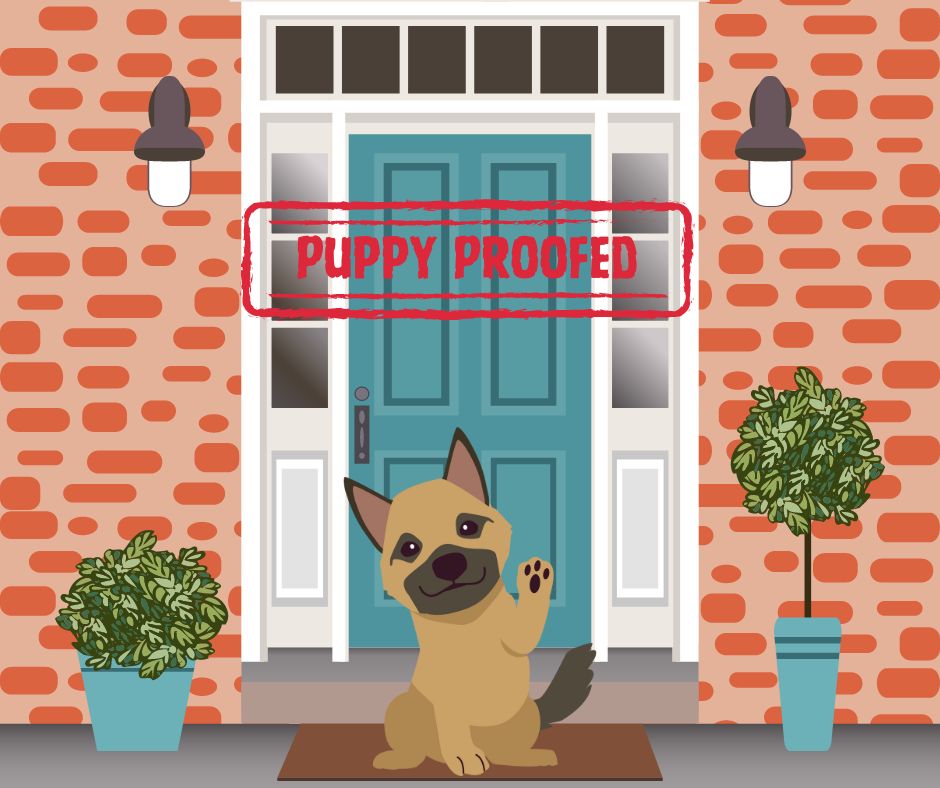
Congratulations on welcoming a German Shepherd into your family! Preparing your home for your new furry friend is an exciting and essential step in ensuring their well-being and happiness. Creating a secure and cosy environment is necessary for these intelligent and energetic dogs to flourish and enjoy their playful nature. Let’s look at the key aspects of setting up your home for a German Shepherd.
Puppy-Proofing: Ensuring a Safe Living Space for German Shepherd Puppies
Just like human toddlers, German Shepherd puppies are curious explorers, and their teething phase can lead them to chew on anything they can find. To create a puppy-proof living space:
| Secure Hazardous Items | To avoid accidents, keep household chemicals, small objects, and electrical cords out of their reach. |
| Invest in Chew Toys | Provide a variety of sturdy and safe chew toys to satisfy their teething needs and deter them from gnawing on furniture or shoes. |
| Create Designated Play Areas | Designate a safe space for playtime and training, making establishing boundaries easier for you and your pup. |
Must-Have Supplies: Choosing the Right Equipment for Essential German Shepherd Care
To meet your German Shepherd’s needs, gather these essential supplies:
| Food and Water Bowls | Invest in durable and appropriately sized bowls for meals and fresh water. |
| Comfortable Bed | Provide a cosy and supportive bed where your GSD can rest and recharge. |
| Sturdy Leash and Collar | Choose a well-fitting collar with an ID tag and a strong leash for daily walks and outdoor adventures. |
Restful Retreat: Creating a Comfortable and Safe Sleeping Area for Your German Shepherd
A good night’s sleep is crucial for your German Shepherd’s well-being. Create a restful sanctuary by:
| Choosing the Right Bed | Select a high-quality orthopaedic dog bed that supports your GSD’s joints, especially as they age. |
| Cosy Blankets | Provide soft blankets for extra comfort, particularly during colder months. |
| Quiet Space | Find a quiet and peaceful area in your home where your GSD can retreat for uninterrupted rest. |
Remember that your home serves as your German Shepherd’s sanctuary, and the time you invest in its preparation will significantly contribute to fostering a loving and nurturing atmosphere for your beloved furry friend.
Nourishing Their Well-Being: Nutrition and Feeding for Crucial German Shepherd Care

Your German Shepherd’s health and vitality depend on providing them with the proper nutrition. A well-balanced diet keeps their wagging tails and bright eyes shining with happiness. Let’s explore the essential aspects of feeding your beloved GSD.
Essential Dietary Requirements for Thriving German Shepherds
German Shepherds are active and intelligent dogs, requiring a nutrient-rich diet to support their energy levels and overall well-being. As a responsible owner, ensure their diet includes:
| High-Quality Protein | When selecting dog food, prioritise options with real meat as the main ingredient, such as chicken, beef, or lamb. Protein is vital for preserving and building your German Shepherd’s muscles. |
| Healthy Fats | Choose food rich in omega-3 and omega-6 fatty acids to enhance your German Shepherd’s coat and skin health while bolstering the immune system. |
| Complex Carbohydrates | Whole grains like brown rice and oats provide sustained energy, keeping your GSD active and ready for playtime. |
| Vitamins and Minerals | Ensure that your German Shepherd’s diet includes a variety of vitamins and minerals to enhance overall health and bolster their immune system. |
Top Picks: Recommended Dog Food Options for Optimal German Shepherd Care
With an array of dog food choices on the market, selecting a high-quality option that aligns with your German Shepherd’s specific needs is essential. Consider the following:
| Premium Dry Dog Food | Look for well-known brands that prioritise natural ingredients and have a reputation for promoting healthy growth in large breed dogs. |
| Wet Dog Food | Adding wet food can provide variety and extra hydration, but it’s essential to complement it with dry food for a balanced diet. |
| Raw or Homemade Diets | Not usually recommended as it’s easy to get the nutrient content wrong. Please consult your veterinarian before considering a raw or homemade diet to ensure it meets your GSD’s nutritional requirements. |
Healthy Habits: Feeding Schedules and Portion Control for Your German Shepherd
A consistent feeding schedule is vital for your German Shepherd’s digestive well-being. It will also help prevent overeating. Divide your German Shepherd’s daily food intake into two to three meals, making adjustments based on age and activity level. Portion control is essential, as overfeeding can lead to obesity, harming their joints and overall health.
Food Matters: Addressing Common Feeding Issues and Allergies in German Shepherds
Like all dogs, German Shepherds can experience food sensitivities and allergies. If you notice symptoms like itching, digestive issues, or skin problems, consult your veterinarian to identify potential allergens. In such cases, they may recommend specialised diets or limited-ingredient formulas to address these concerns effectively.
As you embrace the role of a caring and conscientious German Shepherd parent, remember that a well-fed and nourished pup is a happy and healthy one. By providing the proper nutrition, you’ll foster a lifetime of love, joy, and loyalty with your beloved GSD.
Feeding Age-Related Food for Healthy Growth in German Shepherd Puppies.
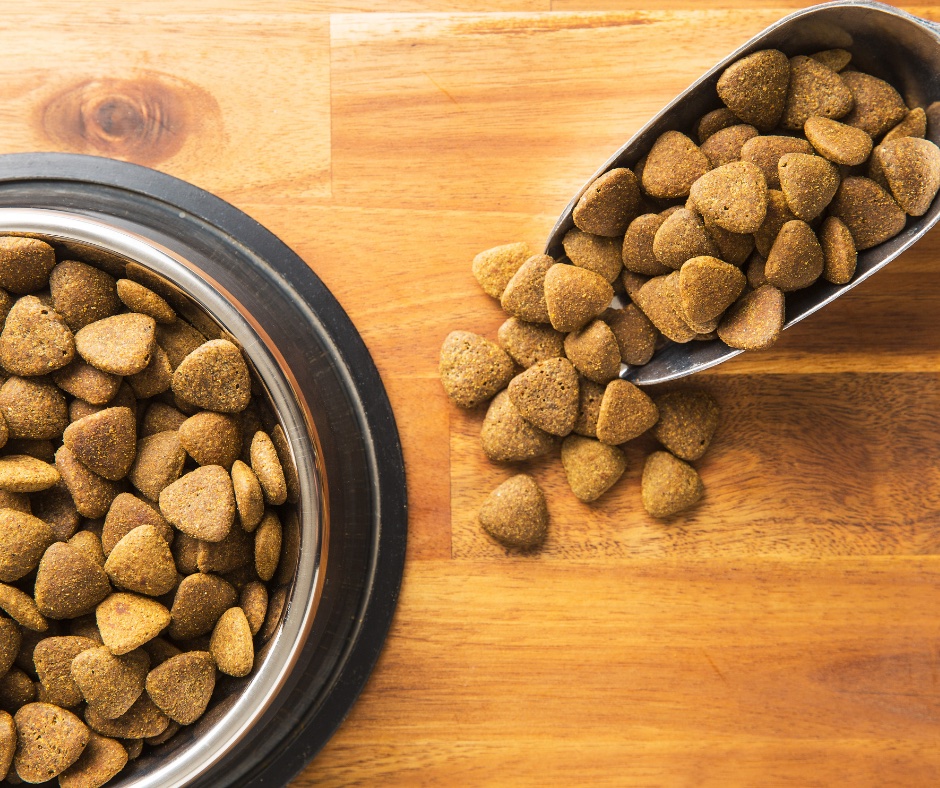
Appropriate nutrition is essential for the healthy growth and development of German Shepherd puppies, and it is particularly important that you feed age-appropriate food to prevent rapid growth.
Feeding specially formulated puppy food for large breeds helps regulate their growth rate and reduces the risk of skeletal and joint issues associated with rapid growth. These specially tailored puppy foods contain balanced essential nutrients like calcium and phosphorus for healthy bone development.
Feeding your German Shepherd puppy age-appropriate food sets them on the path to becoming a robust and healthy adult dog, minimising the likelihood of potential health issues. Always consult your veterinarian to determine the right type and amount of food to suit your puppy’s individual needs.
Foods to Avoid: Keeping Your German Shepherd Safe and Healthy
As responsible pet owners, we must know the foods that can harm our beloved German Shepherds. While sharing treats with our furry companions can be tempting, some human foods can pose serious health risks.
It is crucial to strictly avoid feeding your German Shepherd foods such as chocolate, grapes, raisins, onions, garlic, and avocados, as these can lead to severe health issues, ranging from gastrointestinal upset to more serious conditions like kidney failure and toxicity.
Furthermore, avoiding foods high in fat, salt, or artificial sweeteners is essential, as they can contribute to pancreatitis, sodium poisoning, or potentially life-threatening conditions. Always consult your veterinarian to ensure you provide your German Shepherd with a safe and nutritious diet to promote their well-being and longevity.
Happy tummies, wagging tails, and boundless love await on this fantastic journey with your German Shepherd!
Active and Happy: Exercise An Essential Part of German Shepherd Care
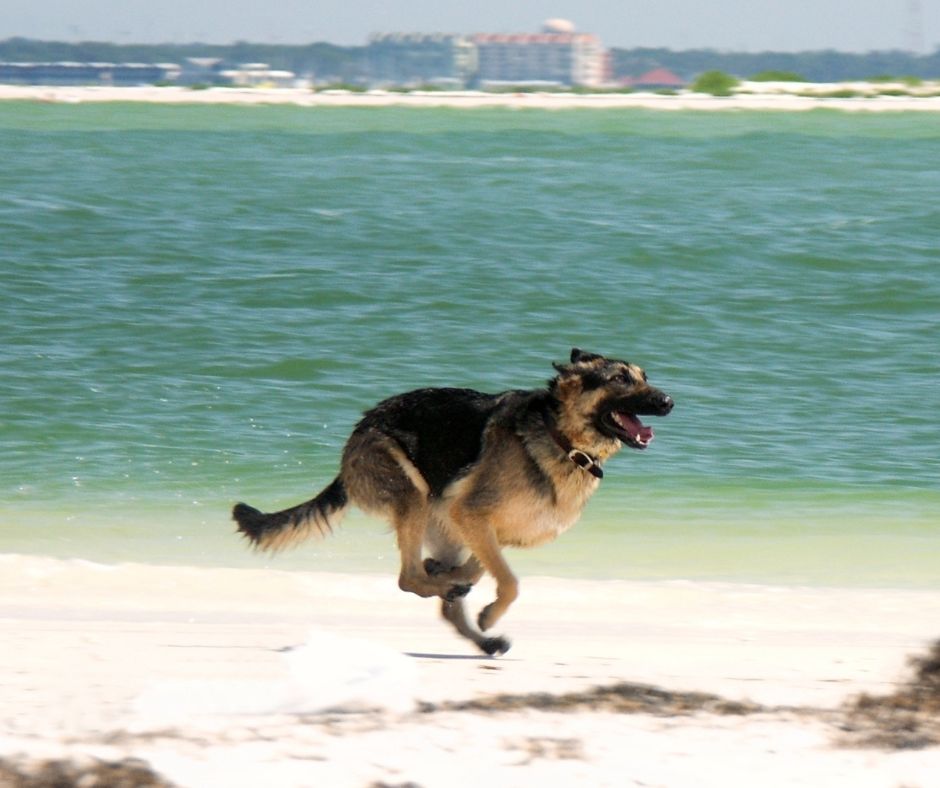
Keeping your German Shepherd active and engaged is key to their well-being and happiness. These intelligent and energetic dogs thrive on physical activities and mental challenges. Let’s explore the world of exercise and play for your furry friend!
Vitality Unleashed: Understanding the Importance of Regular Exercise
Their athleticism and exceptional working abilities are widely recognised. Consistent physical activity is crucial in helping German Shepherds maintain a healthy weight, stave off boredom, and reduce the risk of behavioural issues. A well-exercised GSD is contented, and they’re more likely to exhibit good behaviour at home.
Playful Pursuits: Ideal Exercise Routines and Activities for Your German Shepherd
| Daily Walks | Take your German Shepherd for brisk walks at least twice daily. It’s not only an opportunity for them to burn off energy, but it’s also an excellent bonding time for you both. |
| Running and Jogging | If you’re a jogger or a runner, consider taking your GSD with you. These dogs adore running alongside their human companions and will thoroughly enjoy the activity. |
| Interactive Playtime | Engage your GSD in interactive games like fetch, frisbee, or agility training. Their intelligence and eagerness to please make them perfect playmates for such activities. |
| Hiking and Exploring | If you’re an outdoor enthusiast, your German Shepherd will be the perfect adventure buddy. Take them on hikes and explore nature together – they’ll love every minute of it! |
Mental Agility: Stimulating Your German Shepherd’s Mind Through Interactive Play
Besides physical exercise, providing mental stimulation is essential for the well-being of your German Shepherd. These clever canines need mental challenges to prevent boredom and keep their minds sharp.
| Training Sessions | Engage in regular training sessions to reinforce commands, tricks, and good behaviour. Positive reinforcement techniques work wonders with dogs. |
| Interactive Toys and Puzzles | Invest in interactive toys and puzzles that require problem-solving. These toys will keep your German Shepherds mentally stimulated and entertained. |
| Hide and Seek | Play a game of hide and seek with your dog, hiding their favourite toys or treats around the house for them to find. |
Remember, each German Shepherd has unique exercise preferences and energy levels. Observe your pup’s reactions and adapt your exercise routine accordingly. Balancing physical and mental activities will lead to a healthier, happier, and well-behaved German Shepherd.
Stay tuned for the next sections of our Ultimate German Shepherd Care Guide, where we’ll dive into grooming and hygiene tips to ensure your GSD looks and feels its best!
Beauty in Every Strand: Grooming and Hygiene A Must in German Shepherd Care
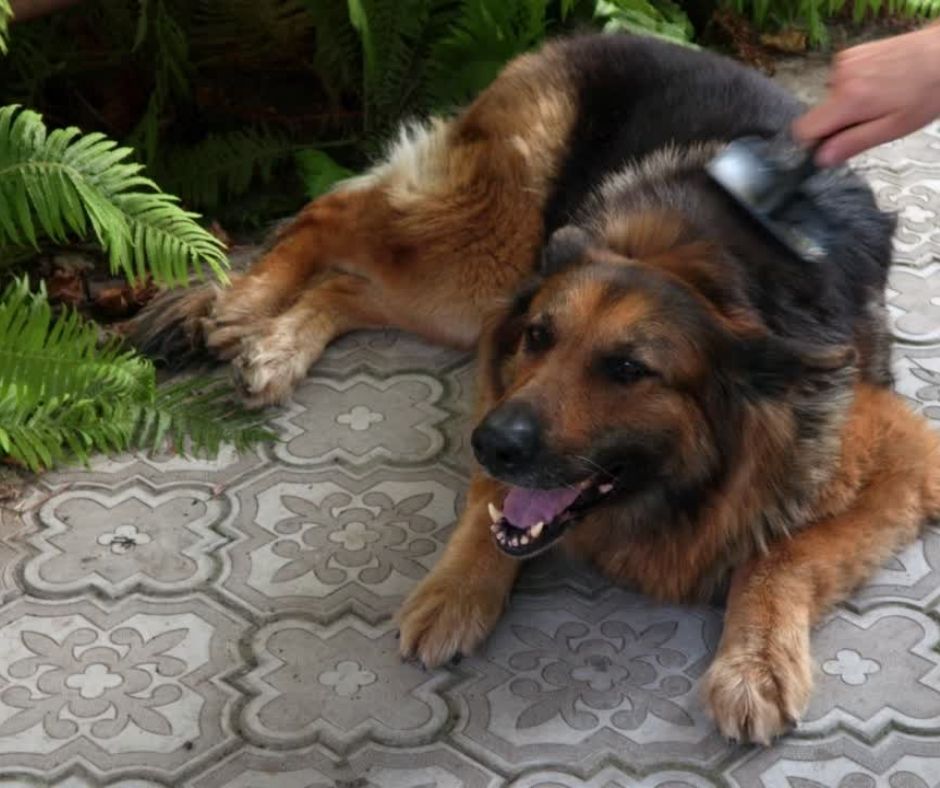
Keeping your German Shepherd looking and feeling their best is essential to their care. From their luscious coat to their paws, let’s explore the world of grooming and hygiene for your beloved GSD!
Coat Care Secrets: Grooming Tips for Maintaining a Healthy and Shiny Coat
German Shepherds boast a magnificent double coat that needs consistent care to ensure its health and shine. Here are some grooming tips to keep their coat looking its best:
| Brushing | Regular brushing is crucial to control shedding and remove loose fur. Use a slicker brush to remove tangles with an undercoat and a de-shedding tool during shedding seasons. |
| Bathing | Bathe your GSD as needed, typically every 6-8 weeks or when they get dirty. Use a high-quality dog shampoo that won’t strip their natural oils. |
| Dealing with Shedding | German Shepherds are moderate to heavy shedders, especially during seasonal changes. Embrace the shedding and have a lint roller ready! |
Bathing Bliss: Frequency and Techniques for Proper German Shepherd Care
| Frequency | As mentioned earlier, bathe your German Shepherd every 6-8 weeks or as needed. Regular bathing can lead to dryness in their skin and coat. |
| Technique | Brush their coat thoroughly to remove loose fur and tangles before bathing. Use lukewarm water and a gentle massaging motion to lather the shampoo. Rinse thoroughly to avoid residue. |
Pearly Whites: Dental Care and Oral Hygiene for Your German Shepherd
Dental care is often overlooked but essential for your GSD’s overall health. Proper oral hygiene is of utmost importance as it can prevent more serious health issues related to dental problems. Here’s how to keep their teeth in good shape:
| Brushing Teeth | You should brush your dog’s teeth regularly with a dog-specific toothbrush and toothpaste. As with humans, regular brushing helps prevent plaque buildup and maintains fresh breath. |
| Dental Chews and Toys | Offer dental chews and toys to satisfy their natural chewing instincts and promote clean and strong teeth. |
Happy Feet: Nail Trimming and Paw Care for Overall German Shepherd Wellness
Trimming your German Shepherd’s nails is essential to prevent overgrowth and discomfort. Here’s how to do it safely:
| Trimming | Use a dog nail clipper and trim the tips of their nails. Be cautious not to cut too close to the quick, as it contains blood vessels. |
| Paw Care | Regularly inspect their paws for cuts, cracks, or foreign objects. Clean their paws after walks to remove debris and prevent infections. |
Proper grooming not only keeps your German Shepherd looking stunning, but it also contributes to their overall well-being. Regular grooming sessions are excellent bonding opportunities, and your GSD will appreciate the love and attention you give them.
With a well-groomed coat and a wagging tail, your German Shepherd will strut their stuff and melt hearts wherever they go!
Wellness First: Health Care and Veterinary Visits for Optimal German Shepherd Care
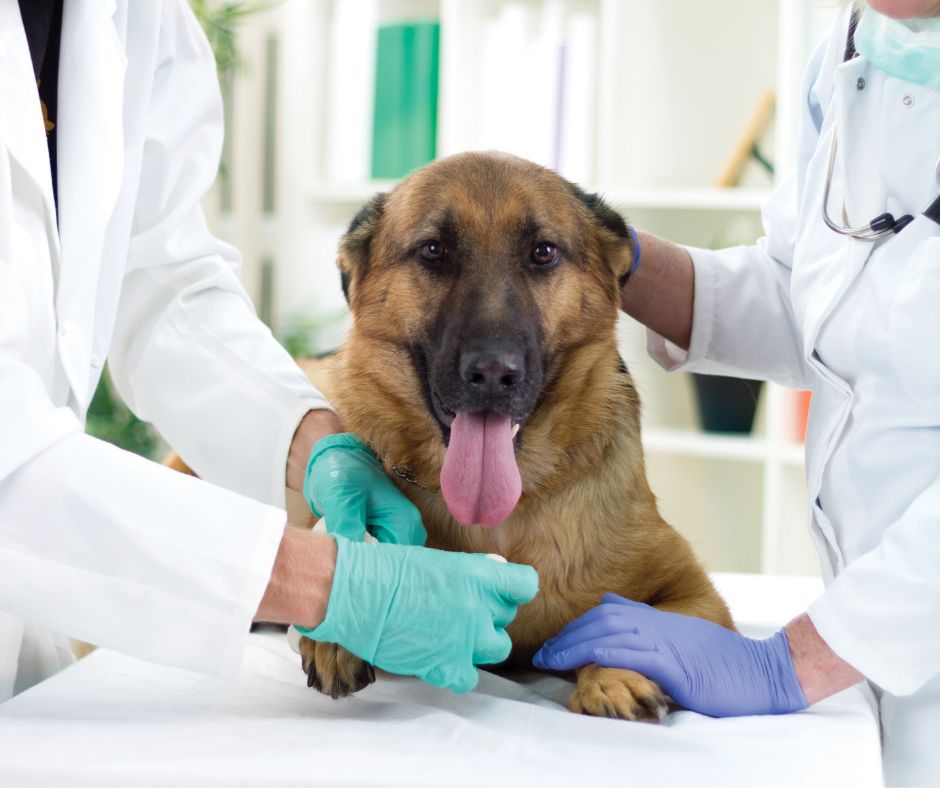
Keeping your German Shepherd in the best of health is vital for their overall well-being. Regular veterinary care and preventive measures will ensure that your furry friend leads a long, happy, and healthy life! Let’s explore the ins and outs of health care for your beloved GSD.
Guardian of Health: Understanding Common Health Issues in German Shepherds
Just like all breeds, German Shepherds are susceptible to certain health issues. Awareness of these conditions can help you take proactive measures and seek prompt veterinary care when needed. Some common health issues in German Shepherds include:
Hip Dysplasia
This is a common health issue in German Shepherds and many other large breeds. It occurs due to a genetic predisposition, where the hip joint fails to develop correctly. Over time, the hip joint’s ball and socket may not fit together snugly, leading to instability and wear. As a result, the joint becomes inflamed, leading to pain, stiffness, and reduced mobility. The condition is often more prevalent in older dogs but can manifest in young puppies too.
Recognising early signs of hip dysplasia is crucial and may include difficulty getting up, reluctance to jump or climb stairs, and a bunny-hopping gait. While genetics play a significant role, factors such as rapid growth, obesity, and inappropriate exercise during the puppy stage can exacerbate the condition. Managing hip dysplasia involves weight management, providing joint supplements, and engaging in low-impact exercise to maintain muscle mass and support the affected joints.
Elbow Dysplasia
Elbow dysplasia is another hereditary condition that affects the elbow joint, particularly the growth and development of the bones in the forelimbs. It commonly occurs in large and giant dog breeds, including German Shepherds. Elbow dysplasia can manifest in different ways, including fragmented coronoid process (FCP), osteochondritis dissecans (OCD), and ununited anconeal process (UAP). These conditions cause pain, lameness, and difficulty in using the affected limb.
What causes elbow dysplasia is not fully understood, although experts believe it relates to genetics and growth factors. Like hip dysplasia, management may include weight control, joint supplements, and controlled exercise. In severe cases, a German Shepherd suffering from the condition may require surgery to relieve pain and enhance joint function.
Bloat (Gastric Dilatation-Volvulus)
Bloat is a severe and life-threatening condition affecting large, deep-chested breeds, such as German Shepherds. This condition happens when the stomach becomes filled with gas causing it to twist on its axis, which in turn causes a blockage at both the entry and exit points. The rapid accumulation of gas and the twisting of the stomach can significantly increase pressure, cutting off blood supply to vital organs.
Symptoms of bloat include a distended abdomen, unproductive retching, restlessness, and signs of pain. Bloat requires immediate veterinary attention, which can rapidly progress and lead to shock and death. To help prevent bloat, it’s essential to feed multiple small meals throughout the day, avoid vigorous exercise after meals, and use elevated feeders to reduce air swallowing while eating.
Degenerative Myelopathy
Degenerative myelopathy is a progressive neurological disease that mainly impacts the spinal cord of German Shepherds and other breeds. The condition is thought to have a genetic component and typically appears in middle-aged to older dogs. Degenerative myelopathy causes the degeneration of the spinal cord’s white matter, leading to hind limb weakness, difficulty walking, and loss of coordination.
As the disease progresses, the dog may become paralysed in the hindquarters. Although degenerative myelopathy has no cure, supportive care can effectively manage the symptoms and maintain the dog’s quality of life. Physical therapy, assistive devices like mobility carts, and keeping the dog comfortable are essential in managing the disease. Our first German Shepherd, Sasha, suffered from this. We talk about her later on in caring for senior dogs.
Exocrine Pancreatic Insufficiency (EPI)
My male dog Cody has this. You can check out his story in the health section of the article, discussing some amazing German Shepherd facts. It is a condition where the pancreas fails to produce sufficient digestive enzymes, leading to malabsorption of nutrients from food. As a result, the dog may experience weight loss, diarrhoea, and poor coat condition despite having a normal appetite. EPI can develop in German Shepherds due to immune-mediated destruction of pancreatic tissue or other causes.
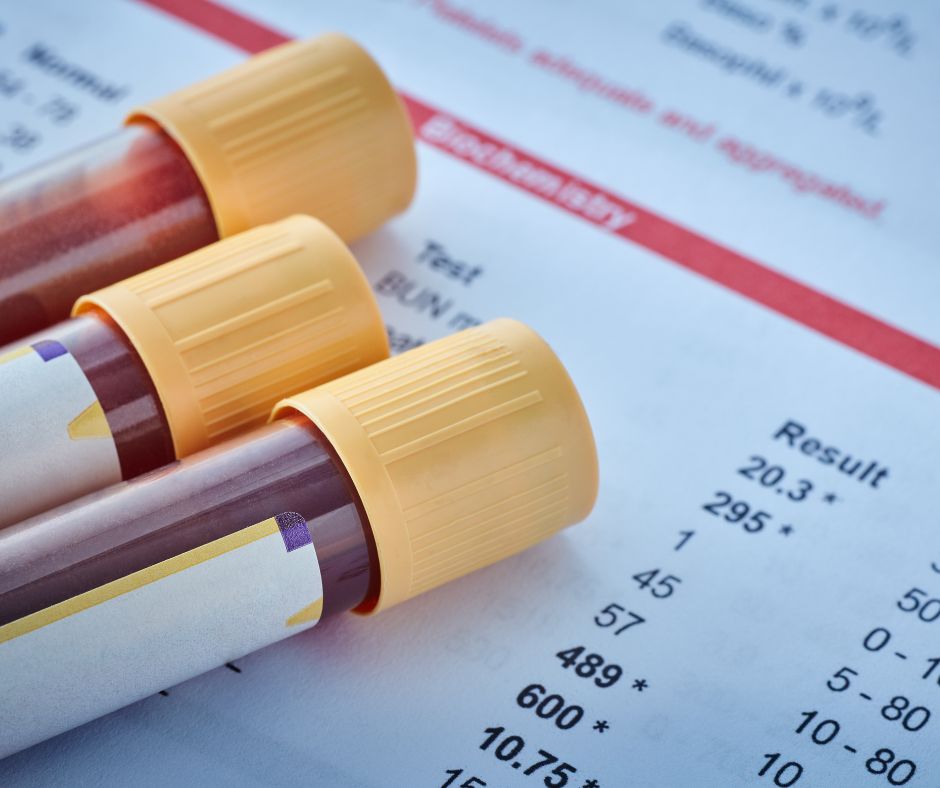
Diagnosis involves blood tests and pancreatic function tests. Management of EPI involves enzyme replacement therapy, where the dog is given enzyme supplements with each meal to aid digestion. Dogs with EPI can lead a healthy and fulfilling life with proper treatment and dietary adjustments.
Allergies
German Shepherds are prone to skin allergies, which environmental allergens, certain foods, or parasites can cause. Allergies can cause itching, redness, and discomfort, leading to skin infections if left untreated. Identifying and avoiding allergens and proper medical treatment can help manage allergy symptoms effectively.
Degenerative Joint Disease (DJD)

Also known as arthritis, DJD can occur in German Shepherds due to age, previous injuries, or underlying conditions like hip dysplasia. DJD causes joint pain, stiffness, and reduced mobility. Managing a healthy weight, providing joint supplements, and engaging in gentle exercise can help alleviate the symptoms of arthritis.
Epilepsy
This is a neurological disorder that can affect German Shepherds, causing seizures of varying severity. While there is no cure for epilepsy, vets often prescribe anticonvulsant medications to help manage the condition.
Panosteitis
Commonly known as “pano,” this condition is prevalent in young German Shepherds during their rapid growth phase. It causes inflammation of the long bones, leading to lameness and pain. Fortunately, most dogs outgrow this condition as they mature.
Hemangiosarcoma
German Shepherds have an elevated risk of developing this aggressive cancer originating from blood vessel cells. Early detection and aggressive treatment are crucial for improving the prognosis in affected dogs.
Canine Degenerative Disc Disease (DDD)
This condition affects the intervertebral discs of the spine and can lead to pain, nerve compression, and even paralysis in severe cases. Management may involve medication, physical therapy, or in some instances, surgical intervention.
Hypothyroidism
German Shepherds can experience an underactive thyroid gland, leading to a decrease in metabolic rate and various symptoms such as weight gain, lethargy, and skin issues. Typically, veterinarians use thyroid hormone replacement therapy to manage this condition.
Understanding these common health issues in German Shepherds is crucial to ensure early detection and timely intervention. This knowledge ensures that your beloved companion receives the care and support needed for a happy and healthy life. Regular veterinary checkups, a balanced diet, appropriate exercise, and responsible breeding practices can reduce the risk and severity of these health conditions.
Preventive Measures: Vaccination and Deworming Schedules for Optimal Care
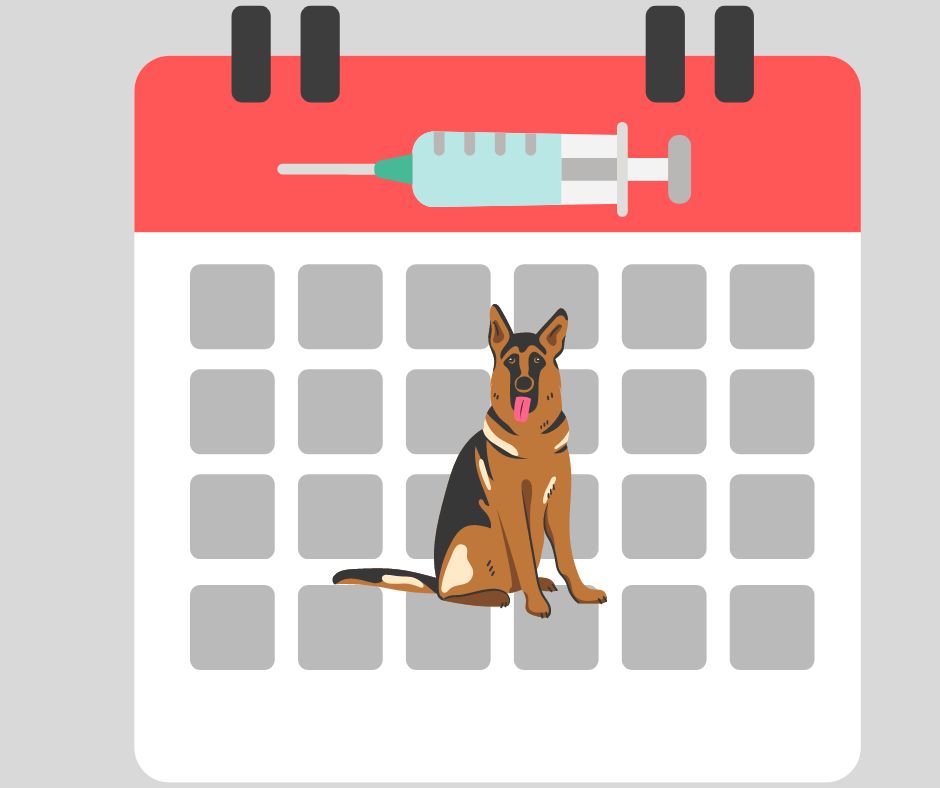
Vaccinations and deworming are essential preventive measures to protect your German Shepherd from infectious diseases and parasites. Consult your veterinarian to create a vaccination schedule tailored to your dog’s needs. Standard vaccinations for GSDs include rabies, distemper, parvovirus, and more, depending on which part of the world you live in.
Defence Mode: Parasite Control and Preventive Care for Your German Shepherd
| Heartworm Prevention | Administer heartworm preventive medication regularly to protect your dog from this potentially fatal parasitic disease. |
| Flea and Tick Control | Use flea and tick prevention products recommended by your veterinarian to prevent infestations and the transmission of diseases. |
| Regular Checkups | Schedule routine veterinary checkups to monitor your GSD’s health and catch any potential issues early. |
Early Detection: Recognising Signs of Illness and Seeking Timely Vet Care
Being attuned to your German Shepherd’s behaviour and health is crucial in catching signs of illness early. Watch for changes in appetite, energy levels, bathroom habits, or unusual behaviours. Don’t hesitate to contact your veterinarian if you notice any concerning symptoms.
You can ensure your German Shepherd lives a happy and healthy life by providing regular health care and veterinary visits. Remember, your furry companion relies on you for their well-being, and with proper care, you can be their lifelong guardian and best friend!
For more information on responsible breeding practices and health considerations in German Shepherds, the German Shepherd Dog Club of America is a great resource.
From Puppies to Seniors: Caring for Your German Shepherd at Every Stage
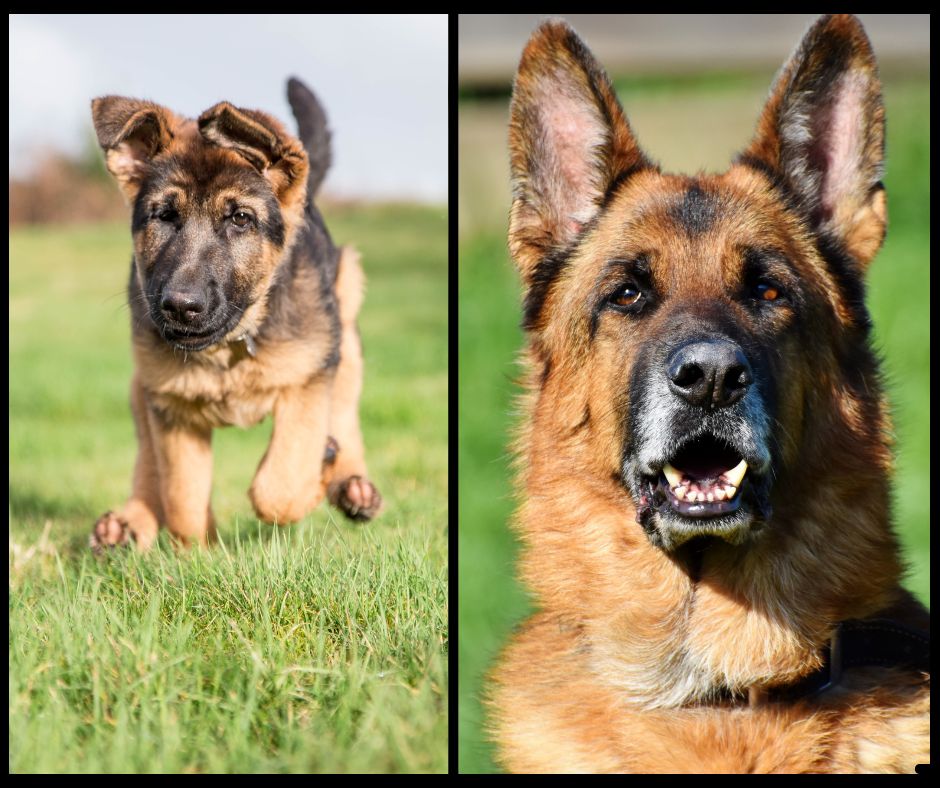
German Shepherds bring joy to our lives at every stage, from adorable puppies to wise seniors. Each phase of their life requires specific care and attention to ensure they lead fulfilling and healthy lives. Let’s explore how to best care for German Shepherd puppies and seniors.
Raising a German Shepherd Puppy: Essential Care Tips and Guidelines
Early Socialisation for German Shepherd Puppies
Socialising your GSD puppy is crucial to help them develop into well-adjusted and confident adults. Introduce them to various people, places, and animals in a positive and controlled manner.
Basic Training for German Shepherd Puppies
Start basic obedience training early to establish good behaviour and manners. Positive reinforcement techniques work best with their intelligent and eager-to-please nature.
Puppy-Proofing for German Shepherd Puppies
GSD puppies are curious explorers, so puppy-proof your home to protect them from hazards like electrical cords and toxic plants.
Feeding Guidelines for German Shepherd Puppies
Provide a balanced diet tailored to your puppy’s needs, including essential nutrients for growth and development. Consult your veterinarian for appropriate feeding guidelines. Always make sure you feed a puppy food specifically designed for large breed puppies. It can be detrimental if they grow too quickly due to being fed the wrong food.
Exercise Balance for German Shepherd Puppies
While exercise is vital, be mindful of their developing joints. Engage in age-appropriate activities to avoid overexertion.
Senior Grace: Tailoring Care for Aging German Shepherds
Tailoring Care for Aging German Shepherds is essential to ensure you give your furry friend the best possible care during their golden years. As your loyal German Shepherd ages, their needs may change, and it’s essential to adapt their care accordingly to ensure they continue to live a happy and comfortable life.
Before we delve into some of the challenges and considerations of caring for senior German Shepherds, I wanted to tell you about Sasha, our first German Shepherd, and the fantastic 15 years we had with her.
Our Beloved Sasha: Embracing Senior Care with Love and Wheels.
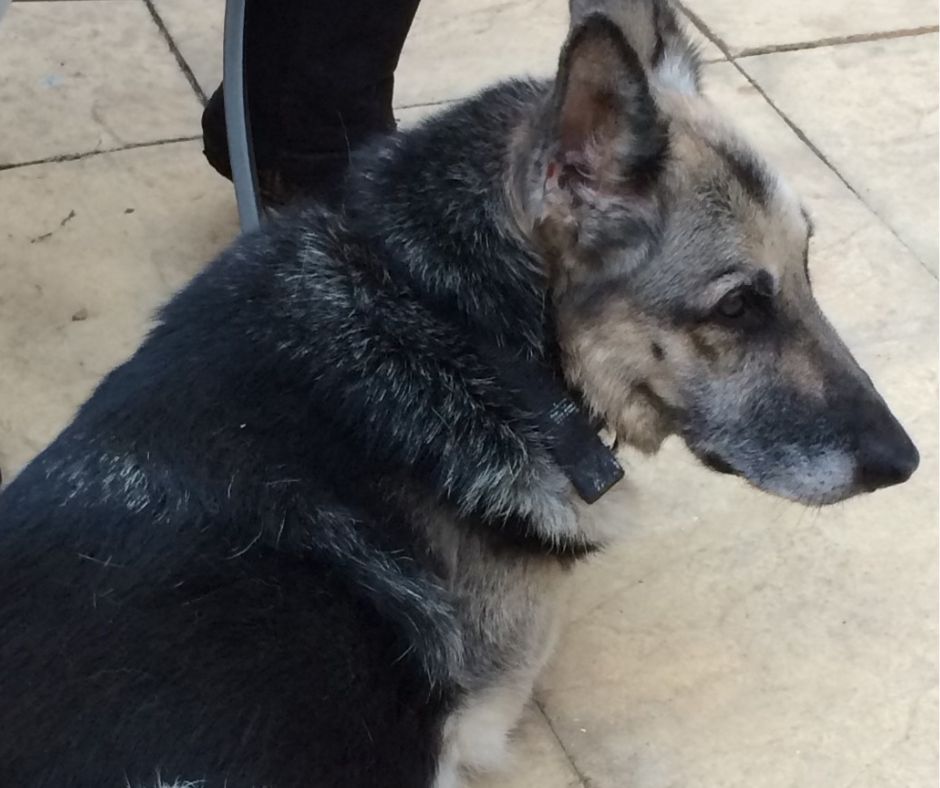
Our beloved German Shepherd, Sasha, filled our lives with joy and unconditional love for nearly 15 years. As she gracefully aged, we noticed some changes in her mobility, and at the age of 9, she was diagnosed with Degenerative Myelopathy (DM). Despite the gradual progression of the condition, Sasha remained resilient and determined to enjoy life to the fullest.
Embracing New Challenges
Around the age of 12, she lost the use of her back legs, and it was a challenging moment for our family. However, we were determined to help Sasha maintain her adventurous spirit. Thanks to the incredible support from “Eddie’s Wheels,” we got her a custom-built wheelchair that gave her newfound independence, allowing her to explore the world with enthusiasm once again.
Adjusting with Love and Compassion
As a result of her condition, Sasha also experienced bladder incontinence, which meant she required the use of diapers or nappies, as we call them here in the UK. Although it needed some adjustments to our daily routines, we were more than willing to accommodate her needs to ensure she remained comfortable and content. Sasha adapted remarkably well to her new circumstances, and her resilience served as an inspiration to all of us.
A Happy and Otherwise Healthy Life
Despite her condition, with regular veterinary checkups and a carefully tailored diet, Sasha continued to lead a happy and otherwise healthy life. Her zest for life and unwavering spirit taught us valuable lessons about compassion, patience, and cherishing every moment with our beloved furry companions.
Embracing Senior Care with Love
As Sasha aged gracefully, she became a true testament to the importance of providing loving care and support to senior dogs. We were incredibly grateful for our time with her and the opportunity to create cherished memories that will forever hold a special place in our hearts. Our journey with Sasha has shown us the significance of embracing senior care with love, ensuring that our furry friends receive all the care and devotion they deserve as they enter their golden years.
Caring for Your Aging Companion: Tips For Senior German Shepherd Wellness
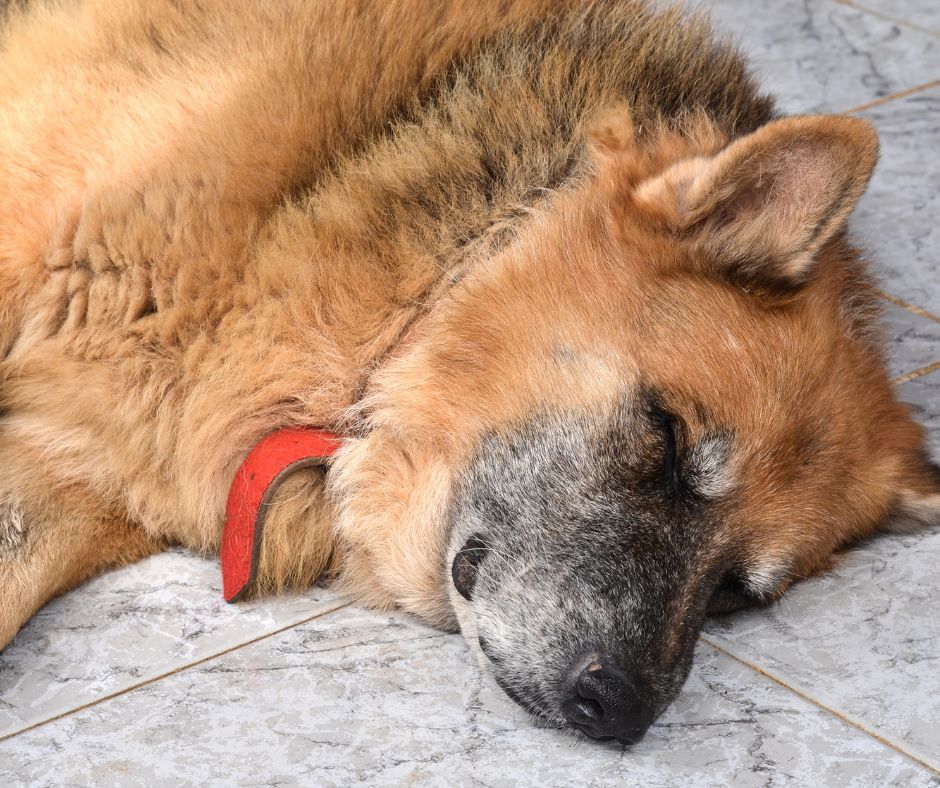
Regular Vet Checkups for Senior German Shepherds
Regular vet checkups become even more critical as your GSD ages to catch and manage age-related health issues early.
Adjusted Diet for Senior German Shepherds
Seniors have different nutritional needs. Choose a senior-specific diet supporting joint health and maintaining a healthy weight.
Joint Health for Senior German Shepherds
Consider joint supplements or medications your vet recommends to support their mobility and ease arthritis symptoms.
Cognitive Stimulation for Senior German Shepherds
Mental exercises and interactive games can keep their minds sharp and prevent cognitive decline.
Comfort and Rest for Senior German Shepherds
Provide a cosy and comfortable sleeping area to ensure they get ample rest, which is essential for their well-being.
No matter the age, shower your German Shepherd with love and attention. Your bond with your furry companion will grow stronger as you nurture and care for them throughout their life journey.
Nurturing Einsteins: Fun Mental Fitness for Your German Shepherd

Keeping your German Shepherd mentally engaged is as important as caring for their physical needs. Mental stimulation is vital in keeping their intelligent minds sharp and preventing boredom. Let’s explore some fun and effective ways to stimulate your beloved GSD mentally.
Engage and Thrive: Keeping Your German Shepherd’s Mind Sharp and Active
German Shepherds are highly intelligent and thrive on mental challenges. Engaging their minds can prevent behavioural issues and keep them content. Here are some engaging activities:
Puzzle Toys and Treat Dispensers
Invest in puzzle toys and treat dispensers that require problem-solving skills to get to the treat inside. These toys help stimulate their natural instincts and keep them entertained for hours.
Hide-and-Seek

Engage your GSD in a playful game of hide-and-seek. Begin by strategically hiding treats around the house and encourage them to use their keen nose and senses to find the hidden treasures.
Obedience Training and Trick Teaching
Continue training your GSD with new commands and tricks. They love learning and performing tasks to please their owners.
Puzzle and Play: Interactive Toys and Games for Enriching German Shepherd Care
Interactive Feeder Bowls
Switching to an interactive feeder bowl for mealtime can turn eating into a mentally stimulating activity for your GSD.
Food Dispensing Toys
These toys will engage your dog’s problem-solving skills and keep them entertained while working for their food.
Scent Games
Play scent games by hiding treats or toys and encouraging your GSD to find them using their keen sense of smell.
Command and Bond: Training Games and Activities for a Happy Shepherd
| Agility Training | Set up an agility course in your backyard or local park. This activity provides both physical exercise and mental stimulation for your GSD. |
| Clicker Training | Clicker training is an effective positive reinforcement technique that enhances the bond between you and your GSD while teaching them new skills. |
| Nose Work | Engage your GSD’s sense of smell by creating scent trails or hiding treats for them to find. |
By incorporating mental stimulation into your German Shepherd’s daily routine, you’ll have a happier, healthier, and well-balanced companion. Mix it up and introduce new activities to keep their minds active and engaged. A mentally fulfilled GSD is content and well-behaved furry family member!
Wanderlust and Adventures: Traveling and Boarding

Whether planning a weekend getaway or a long vacation, taking your beloved German Shepherd along can be a wonderful experience. However, travelling with a GSD requires some preparation and consideration to ensure their safety and comfort. Let’s explore some useful tips for travelling and boarding with your loyal companion.
On the Move: Tips for Traveling with Your Lively German Shepherd Companion
Crate Training
Before you hit the road, ensure your GSD is comfortable in a well-ventilated and secure crate. Crate training offers a safe and secure space for your furry friend and helps minimise travel anxiety.
Car Rides
Gradually introduce your GSD to car rides by taking short trips. Use positive reinforcement and treats to create a positive association with travelling in the car.
Rest Stops and Exercise
Plan regular rest stops during long journeys to allow your GSD to stretch their legs, relieve themselves, and stay hydrated. Keep them leashed and under control during breaks.
Identification and Microchipping
Ensure your German Shepherd wears a sturdy collar with an updated identification tag with your contact information. In many countries microchipping is a legal requirement, but even if it is not, consider getting them done for added security.
Safe Haven Away: Choosing the Right Boarding Options for German Shepherd Care
Professional Pet Sitters
Hiring a professional pet sitter can be an excellent option if your GSD is more comfortable in their home environment. Pet sitters allow your dog to follow their routine while receiving personalised care.
Dog Boarding Facilities
Research and choose reputable dog boarding facilities that cater to large breeds like German Shepherds. Visit the facility beforehand to ensure it meets your cleanliness and safety standards.
Pet-Friendly Accommodations
Before booking a hotel or vacation rental, ensure they are pet-friendly and enquire about any potential size or breed restrictions.
Family and Friends
Consider entrusting your German Shepherd’s care to a family member or friend who knows your dog well and can provide attention and care.
Pre-boarding Visit
Consider a pre-boarding visit to the facility for longer trips to familiarise your GSD with the surroundings and staff.
Remember, your German Shepherd’s well-being is paramount, so choose the best boarding option with their personality and needs. Additionally, maintain a positive and reassuring attitude during travel or boarding to ease any stress your furry friend may experience.
With these tips, you can enjoy your adventures with your loyal GSD companion, knowing you’ve taken the necessary steps to ensure their comfort and happiness on the journey.
Tailored Tips: GSD-Specific Care Considerations for a Thriving Companion

German Shepherds are unique and wonderful companions, and their care requires some specific attention to cater to their breed’s characteristics and needs. Let’s delve into some essential care tips tailored specifically for German Shepherds.
Fur and Fluff: Handling Shedding and Grooming Challenges with Ease
Regular Brushing
Renowned for their thick double coat, German Shepherds need regular brushing to manage shedding and maintain a healthy coat. Brushing 2-3 times a week helps minimise loose hair around your home.
Seasonal Shedding
GSDs undergo seasonal shedding, “blowing their coat” during spring and fall. During these times, daily brushing is crucial to manage excessive shedding.
Bathing Frequency
German Shepherds generally do not need frequent baths. Aim for bathing every 6-8 weeks or when they get dirty. Frequent bathing strips away the natural oils and can leave their skin dry.
Nail Trimming
Keep an eye on your GSD’s nails and trim them regularly. If their nails are allowed to get too long, it can cause discomfort and affect their gait.
Ears and Eyes Care
Inspect their ears regularly for signs of infection and clean them gently. Additionally, check their eyes for any redness or discharge, which may indicate an issue.
Energy Unleashed: Managing Exercise Needs for Vibrant German Shepherd Care
Daily Exercise
German Shepherds are high-energy dogs that require daily exercise to stay happy and healthy. Aim for at least 1-2 hours of physical activity, such as walks, playtime, or agility training.
Mental Stimulation
Engage their intelligent minds with puzzle toys, interactive games, and training sessions. Mental stimulation is as crucial as physical exercise for GSDs.
Obedience Training
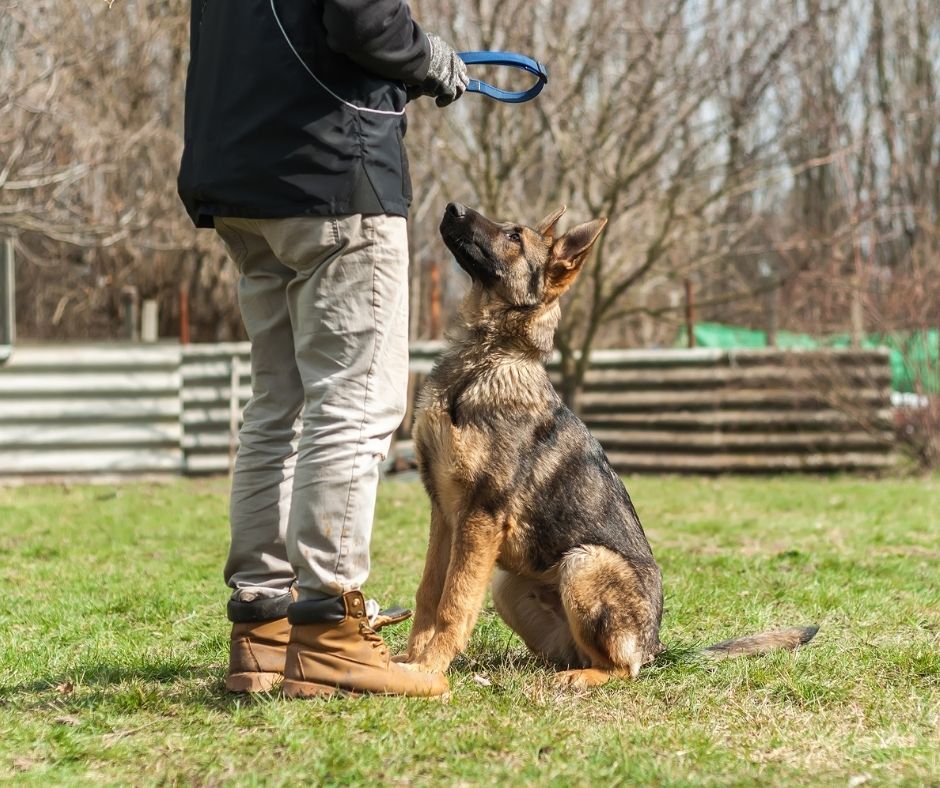
German Shepherds thrive on structure and training. Enrol them in obedience classes to reinforce good behaviour and build a strong bond with your furry friend.
Socialisation
Introduce your GSD to various people, places, and other dogs from a young age. Proper socialisation helps prevent behavioural issues and fearfulness.
Golden Years: Special Considerations for Older German Shepherds
Vet Checkups
Regular vet checkups become even more critical as your GSD ages to catch age-related health concerns early.
Joint Health
Provide supplements or specialised food to support joint health and mobility in senior GSDs.
Cognitive Stimulation
Keep their minds active with gentle training exercises and mentally stimulating games to reduce cognitive decline.
Comfort and Rest
Provide soft and comfortable bedding to ease joint pain or discomfort during sleep and rest.
With these GSD-specific care tips, you can create a tailored care routine that caters to your German Shepherd’s unique needs. A happy and healthy German Shepherd is a true testament to the love and care you provide.
Pup or Adult: Getting a German Shepherd Puppy vs Adopting an Adult Dog
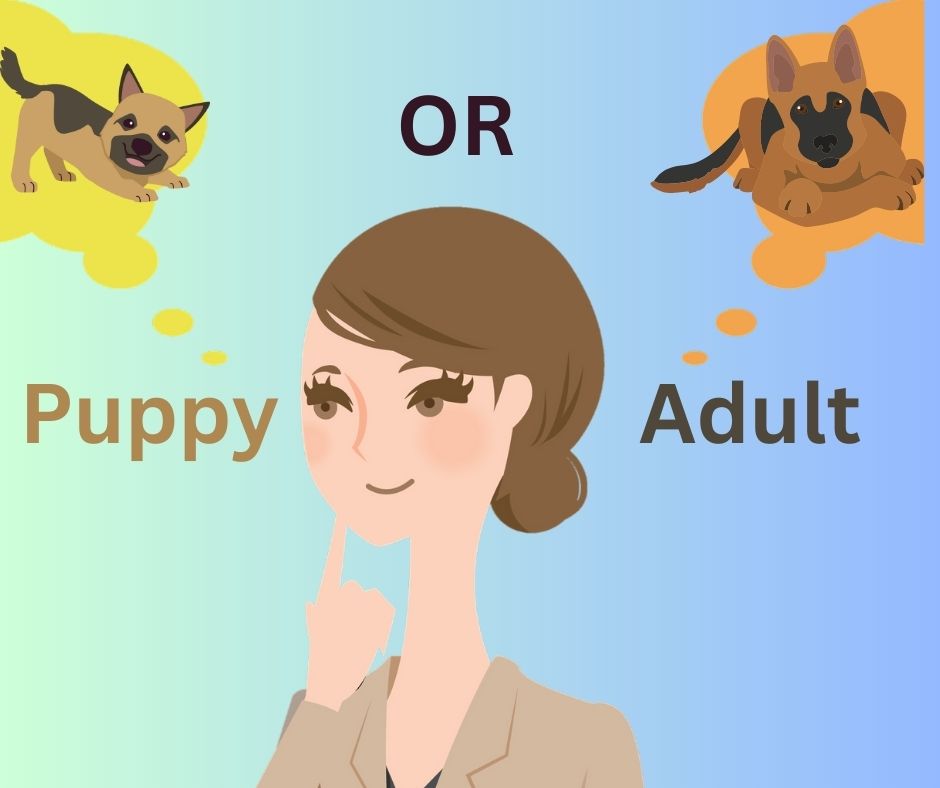
Bringing a new German Shepherd into your life is an exciting and life-changing decision. Whether you’re considering a playful puppy or a more mature companion, it’s essential to understand the unique aspects of each option. Let’s explore the factors you should consider when deciding between a German Shepherd puppy and an adult dog.
Puppy Love: The Joys and Responsibilities of Raising a German Shepherd Puppy
Early Development of German Shepherd Puppies
Puppies are adorable bundles of energy, and early socialisation and training play a crucial role in shaping their behaviour and personality as they grow.
Bonding Opportunity with German Shepherd Puppies
Raising a puppy provides an opportunity for a strong and deep bond to form between you and your GSD from an early age.
Training and Molding German Shepherd Puppies
Puppies are like sponges, absorbing information and learning quickly. Consistent and positive training sets the foundation for good behaviour.
Energy and Playfulness of German Shepherd Puppies
With their abundant vitality and playfulness, puppies make excellent companions for active families or individuals.
Long-Term Commitment for German Shepherd Puppies
Remember that raising a puppy requires a significant amount of time, patience, and commitment.
Adult Companionship: Considering the Benefits of Adopting an Adult German Shepherd

Established Personality of Adult German Shepherds
With adult dogs, you have a clearer understanding of their personality, temperament, and energy level.
Potential Training and Retraining Adult German Shepherds
Adult GSDs might already have some training, but they can also be open to learning new commands and behaviours.
Lower Energy Needs of Adult German Shepherds
Adult GSDs generally have lower energy levels than puppies, which might be a better fit for less active households.
Rescue and Adoption of Adult German Shepherds
Adopting an adult GSD from a shelter or rescue organisation gives a deserving dog a second chance at a loving home.
Potential Health Concerns of Adult German Shepherds
When adopting an adult GSD, be aware of any pre-existing health conditions and seek proper medical care.
Choosing the Perfect Match: Factors to Consider When Deciding on a Puppy or Adult Dog
Time and Availability for German Shepherd Care
Puppies require more time, attention, and training, while adult dogs may need time to adjust to their new environment.
Family Situation and German Shepherd Care
Consider the age and dynamics of your family and any pets when deciding.
Space and Environment for German Shepherd Care
Assess whether your living situation and environment accommodate a puppy’s needs or if an adult dog fits better.
Allergies and Shedding in German Shepherds
Consider any allergies or sensitivities in your household when choosing between a puppy and an adult with established shedding patterns.
Personal Preference for German Shepherd Care
Ultimately, your preferences and lifestyle will play a significant role in choosing the right companion.
Remember, German Shepherd puppies and adult dogs can make beautiful additions to your family. Whether you choose a playful puppy or a seasoned companion, with love, care, and understanding, your German Shepherd will thrive and bring joy to your life for years.
Common Mistakes to Avoid: Ensuring Optimal German Shepherd Care

While providing the best possible care for your German Shepherd is a priority, it’s essential to be aware of common mistakes many pet owners unintentionally make. Let’s explore some of the most common pitfalls in German Shepherd care and how to avoid them.
Active and Content: Meeting Exercise Requirements for Happy German Shepherds
German Shepherds are spirited and energetic companions. To maintain their well-being both physically and mentally, they require regular exercise. Failing to provide enough exercise can lead to behavioural issues, restlessness, and even health problems. Make time for daily walks, interactive play, and mentally stimulating activities to keep your GSD engaged and content.
Socialisation Success: The Importance of Training and Socialisation for German Shepherds
Early socialisation is crucial for German Shepherds to develop into well-adjusted and confident adults. They may become shy, fearful, or aggressive without proper socialisation. Additionally, consistent training helps establish boundaries and reinforces positive behaviours. Enrol your German Shepherd in obedience classes and expose them to various people, places, and experiences to ensure they grow into well-rounded companions.
Vigilance and Care: Overcoming the Overlooked Signs of Health Issues in German Shepherds
German Shepherds are prone to specific health conditions, such as hip dysplasia, degenerative myelopathy, and bloat. Paying attention to changes in your German Shepherd’s behaviour, appetite, or mobility is essential. Regular visits to the veterinarian play a crucial role in detecting potential health issues early on. Don’t ignore signs of discomfort or unusual behaviour; seek professional advice promptly.
Steer clear of these common mistakes to ensure your German Shepherd enjoys a happy and healthy life. Remember that each dog is unique, and understanding their needs is vital to providing the best care possible. With love, attention, and proper care, your German Shepherd will be a devoted and joyful companion for many years.
Frequently Asked Questions (FAQs) About German Shepherd Care

How much exercise does a German Shepherd need daily?
German Shepherds are highly active and energetic dogs. They typically require at least 1-2 hours of exercise daily to stay physically and mentally stimulated. Regular walks, playtime, and interactive activities are essential for their well-being.
What is the best diet for a German Shepherd?
Ensuring you provide a nutritious and balanced diet is vital for the health of a German Shepherd. Opting for high-quality commercial dog food that caters to their specific nutritional requirements is advisable. Consult your veterinarian for personalised guidance on the proper diet based on your dog’s age, size, and activity level.
How often should I groom my German Shepherd?
Regular grooming is essential for German Shepherds. Brush their coat 2-3 times weekly to prevent matting and reduce shedding. Bathe them as needed, usually every 6-8 weeks, or when they get dirty. Additionally, trim their nails every 1-2 months and maintain dental hygiene regularly.
When should I start training my German Shepherd puppy?
Early training is essential for German Shepherd puppies. Start basic obedience training as early as 8-10 weeks old. Socialisation with other dogs and people should begin even earlier, ideally between 3-16 weeks of age.
How can I prevent health issues in my German Shepherd?
Regular veterinary checkups and preventive care are vital. Follow vaccination schedules, keep up with deworming, and provide flea and tick protection. Maintain a healthy diet, exercise regularly, and promptly attend to any signs of discomfort or illness.
How do I introduce my German Shepherd to new environments and people?
Gradual introductions are critical. Allow your German Shepherd to explore new environments at their own pace and introduce them to new people calmly and positively. Always use positive reinforcement to build their confidence and trust.
Are German Shepherds good with children and other pets?
Yes, German Shepherds can be wonderful family pets when properly socialised and trained. They are generally good with children, but supervision is essential to ensure safe and respectful interactions. With early socialisation, they can coexist well with other pets.
How do I handle excessive shedding in my German Shepherd?
Regular grooming and brushing can help manage shedding. Invest in a high-quality shedding brush to remove loose fur and reduce shedding around the house. Remember that German Shepherds typically experience seasonal shedding, which can be more pronounced during certain times of the year.
Are German Shepherds prone to specific health issues?
While German Shepherds are generally healthy dogs, they may be prone to certain conditions such as hip dysplasia, elbow dysplasia, and degenerative myelopathy. Consistent veterinary checkups and embracing a healthy lifestyle can assist in early identification and effective management of these concerns.
Can German shepherds be left alone for 7 hours?
While German Shepherds are independent and resilient dogs, leaving them alone for extended periods, such as 7 hours, is not recommended. They are social animals and thrive on human companionship. Prolonged periods of solitude can lead to feelings of anxiety, boredom, and even undesirable behaviours. The time you can leave a German Shepherd alone depends on age and temperament. With proper training, adult dogs can be left alone for up to 4 hours. Puppies need more attention and should not be left alone for long. Provide water, a comfortable area, and toys. For extended periods, consider a dog walker or pet sitter.
Conclusion: Embarking on a Journey of Love and Care for Your German Shepherd
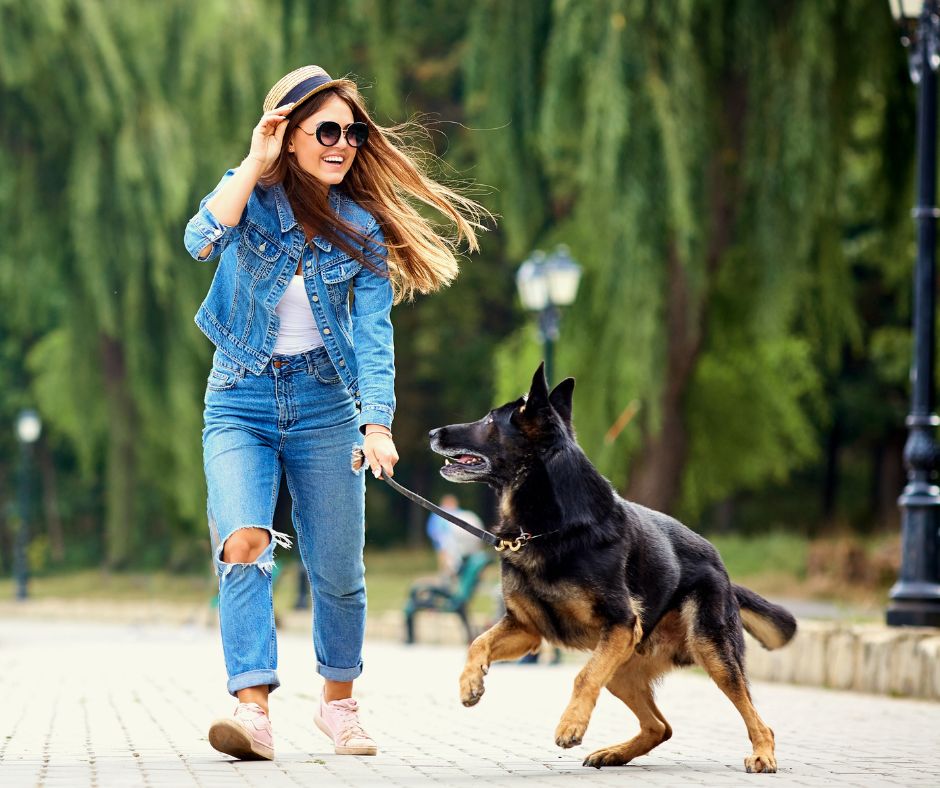
Congratulations on taking the first step toward providing the best care for your beloved German Shepherd! This guide covers many topics to ensure your furry friend leads a happy, healthy, and fulfilling life. Let’s recap the essential German Shepherd care tips and reiterate the significance of a loving and attentive approach to their well-being.
Recap of Essential German Shepherd Care Tips: A Path to a Joyful Life Together
| Nutrition | Feed your German Shepherd a balanced diet that meets their nutritional requirements. Choose high-quality dog food and avoid overfeeding to prevent obesity. |
| Exercise | Regular exercise is vital to physically and mentally stimulating your German Shepherd. Engage in daily walks, playtime, and interactive activities. |
| Grooming | Maintain your German Shepherd’s coat, nails, teeth, and overall hygiene to promote health and appearance. |
| Healthcare | Stay proactive in managing your GSD’s health. Schedule regular vet checkups, follow vaccination schedules, and provide preventive care against parasites. |
| Socialisation and Training | Early socialisation and consistent training are vital for your German Shepherd’s development and well-rounded behaviour. |
| Special Considerations | Tailor care to the needs of German Shepherd puppies, seniors, and those with shedding or energy challenges. |
Love in Every Wag: Emphasising the Importance of a Loving Approach to German Shepherd Care
German Shepherds are incredibly loyal and affectionate dogs. They form strong bonds with their human families and thrive in loving environments. Your presence, attention, and affection are essential for their emotional well-being.
Cherishing the Moments: Wishing You a Happy and Healthy Life with Your Beloved German Shepherd
As you care for your German Shepherd, remember they rely on you for their happiness and health. Embrace the joys of having a faithful companion, and cherish every moment you spend together.
By offering top-notch care for your German Shepherd, you’ll forge an inseparable bond with your furry companion that will endure a lifetime. Their unwavering loyalty and boundless love will be a constant reminder of the fulfilment of being a responsible and caring pet owner.
Thank you for taking the time to read my guide on German Shepherd care. I hope you find it a valuable resource that brings you and your beloved GSD many happy and healthy years together! If you have any questions or want to share your experiences with these fabulous dogs. Let’s continue to celebrate and cherish the remarkable German Shepherds and all the joy they bring to the world!

